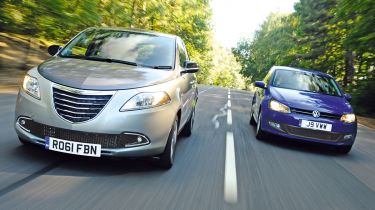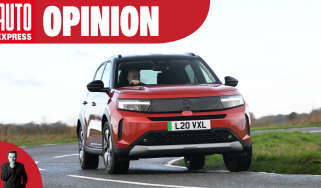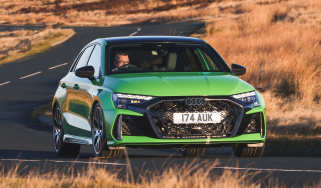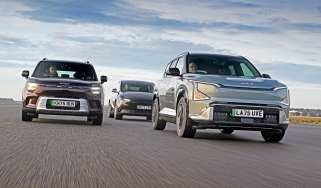Chrysler Ypsilon TwinAir vs Volkswagen Polo 1.4
Can eye-catching supermini beat one of the class’s best?
The Ypsilon leads the charge as Chrysler bids to transform its fortunes in the UK. And this striking new supermini promises unrivalled levels of luxury, refinement and technology.
Based on a stretched Fiat Panda platform, the Ypsilon certainly stands out from the crowd – although not necessarily for the right reasons. Its dizzying array of curves and creases, bold chrome grille and narrow stance result in a fussy and ungainly appearance. The two-tone paint finish applied to our test car – a £600 optional extra – failed to improve matters.
In contrast, the Polo blends into the background, with its conservative looks. However, the familiar styling cues and neat proportions ensure the VW oozes understated class.
It’s a similar story when you climb aboard. The Ypsilon’s bold cabin is more eye-catching than the sensibly styled Polo’s, with its centrally mounted instrument pod, high-set gearlever and attractively patterned Castiglio seat trim.
It can’t match the VW’s top-notch quality, though. Look around and you’ll spot plenty of hard and shiny plastics, while the switchgear doesn’t operate with the same crisp recision.
What’s more, squeaks and rattles from the cabin of our test car suggested that it wasn’t as solidly screwed together as its rival.
Used - available now

2024 BMW
iX3
22,850 milesAutomaticElectric
Cash £25,921
2022 BMW
i3
38,173 milesAutomaticElectric
Cash £12,725
2023 Audi
e-tron
33,903 milesAutomaticElectric
Cash £19,032
2023 Audi
e-tron
15,580 milesAutomaticElectric
Cash £28,508The Ypsilon’s high-set driving position isn’t as comfortable as the Polo’s, while the thick C-pillars severely restrict over-the-shoulder visibility. Still, the car’s compact dimensions make it an ideal choice for crowded city streets.
There’s little to separate the two in terms of standard kit, as both feature air-conditioning, electric windows and alloy wheels. In a bid to boost its luxury credentials, the Chrysler adds ambient cabin lighting and a leather-trimmed wheel. It’s also possible to specify executive car options, such as xenon headlamps, an eight-speaker Bose hi-fi and a clever self-parking system.
Sadly, the Ypsilon is beaten by the Polo for practicality. The Chrysler’s tall stance means there is plenty of headroom, but anyone in the back will find less space for legs and shoulders. It also can’t match the VW for cubby space, as its door pockets and glovebox are much more cramped.
Opening the tailgate reveals a 245-litre load bay, which is 35 litres less than in the VW. The Ypsilon also does without the Polo’s neat false boot floor, while its 60:40 split rear bench doesn’t fold completely flat.
So, can the Chrysler claw back some ground on the move? The initial signs are good, as it’s powered by the excellent turbocharged two-cylinder TwinAir engine that made its debut in the Fiat 500 last year.
With a healthy 145Nm torque output, the characterful 875cc engine provides much stronger mid-range pace than its larger-capacity rival. At the test track, it needed 13.4 seconds to complete the 50-70mph test – a full three seconds less than the VW.
Yet what the Ypsilon gains in performance, it loses in refinement. Despite Chrysler’s bold claims, the car falls short of class leaders in this area. The engine’s thrummy soundtrack is great fun, but it’s nowhere near as quiet as the Polo’s 1.4-litre four-cylinder engine, while wind and road noise are more intrusive.
Further damaging the car’s upmarket aspirations is the poorly controlled ride. A soft suspension set-up means the Ypsilon wallows over big bumps and crashes noisily into potholes. While the Polo is firmer, it copes better with poorly surfaced roads.
The VW also steals a march on the Chrysler over twisting back roads. Neither model can rival the Ford Fiesta for driver appeal, but the composed Polo’s handling is leagues ahead of the Ypsilon’s.
The Chrysler’s steering offers very little feedback, grip levels are low and mid-corner bumps severely upset its composure.
More worryingly, the car feels unstable during hard braking, wandering disconcertingly from side to side. To make matters worse, ESP is a £325 optional extra – this valuable safety addition is standard on the Polo. Still, you should be able to afford this extra with the money saved on road tax.
With CO2 emissions of 99g/km, the Ypsilon is exempt from the London Congestion Charge and qualifies for a free tax disc. The Polo’s output of 139g/km means you’ll need to fork out a hefty £115 for a year’s road fund licence.
If you want to stand out from the crowd, then there’s no denying the Ypsilon is a bold choice. It also brings some clever big car features to the supermini sector. Yet on this evidence, the car falls well short of Chrysler’s claims for class-leading luxury, comfort and refinement. Add lacklustre driving dynamics and a low-rent cabin to the mix, and it’s hard to see it toppling the Polo.



